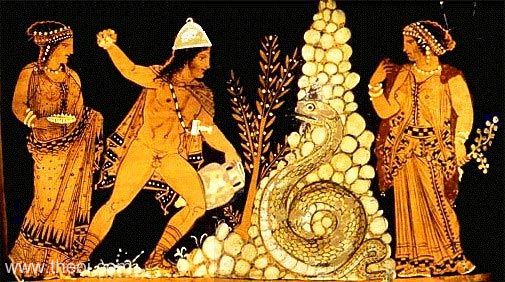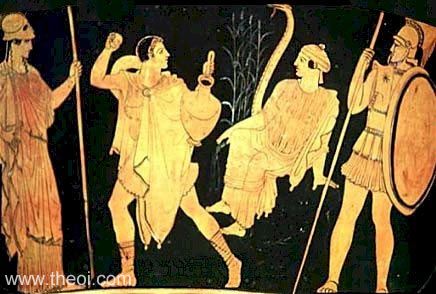Theban & Argive Naiad Nymph of Greek Mythology (original) (raw)
Greek Mythology >> Nymphs >> Naiads >> Ismene
ISMENE
Translation
Knowledgeable (ismê)
Harmonia, Cadmus, the Dragon and Ismene, Paestan red-figure krater C4th B.C., Musée du Louvre
ISMENE was the Naiad-nymph of the Ismenian spring of Thebes in Boiotia (central Greece). She was a daughter of the river Asopos and the wife of Argos, eponymous-king of the Argive land. The couple were ancestors of the royal houses of Argos and Thebes though their descendants Danaos (Danaus) and Kadmos (Cadmus).
The spring of Ismene was guarded by a Drakon (Dragon-Serpent) sacred to the god Ares which was slain by the hero Kadmos at the founding of Thebes.
Ismene, as nymph of the Ismenian spring, was essentially the same as Melia, wife of Inakhos, and Melia, love of Apollon. The stories of these three nymphs, however, occur in unrelated sagas.
PARENTS
ASOPOS (Apollodorus 2.5)
OFFSPRING
[1] IASOS (by Argos) (Castor Frag, Apollodorus 2.5)
[2] ARGOS PANOPTES (by Argos) (Hesiod Cercopes Frag, Apollodorus 2.6)
ENCYCLOPEDIA
ISME′NE (Ismênê). A daughter of Asopus and Metope, and wife of Argus, by whom she became the mother of Iasus and Io. (Apoiiod. ii. 1 § 3.)
Source: Dictionary of Greek and Roman Biography and Mythology.
CLASSICAL LITERATURE QUOTES
Athena, Cadmus, the Dragon, Ismene and Ares, Athenian red-figure calyx krater C5th B.C., Metropolitan Museum of Art
Pseudo-Apollodorus, Bibliotheca 2. 5 (trans. Aldrich) (Greek mythographer C2nd A.D.) :
"To Okeanos (Oceanus) and Tethys was born a son Inakhos (Inachus), after whom the Inakhos River in Argos is named. By Melia, daughter of Okeanos, he had sons named Phoroneus and Aigialeus (Aegialeus). Although Aigialeus died childess, his whole land was called Aigialeia. Phoroneus ruled the entire region later called the Peloponnesos, and by a Nymphe named Teledike (Teledice) fathered Apis and Niobe . . . Niobe, the first mortal woman with whom Zeus had sex, bore Zeus a son Argos (Argus) . . . As for Argos, he got the rule and named the Peloponnesos Argos after himself. He married Euadne (Evadne), daughter of Strymon and Neaira (Neaera), and sired Ekbasos (Ecbasus), Peiras, Epidauros (Epidaurus), and Kriasos (Criasus), who also inhereited the rule. Argos and Asopos' daughter Ismene had a son Iasos (Iasus), who is alleged to be the father of Io, although the chronicler Kastor and many of the tragic poets hold that Io is Inakhos' daughter."
Pseudo-Apollodorus, Bibliotheca 2. 6 :
"Argos Panoptes [with the hundred eyes] . . . Kerkops (Cercops) [poet C6th B.C.] calls him a son of Argos and Asopos' daugher Ismene."
SOURCES
GREEK
- Apollodorus, The Library - Greek Mythography C2nd A.D.
BIBLIOGRAPHY
A complete bibliography of the translations quoted on this page.

